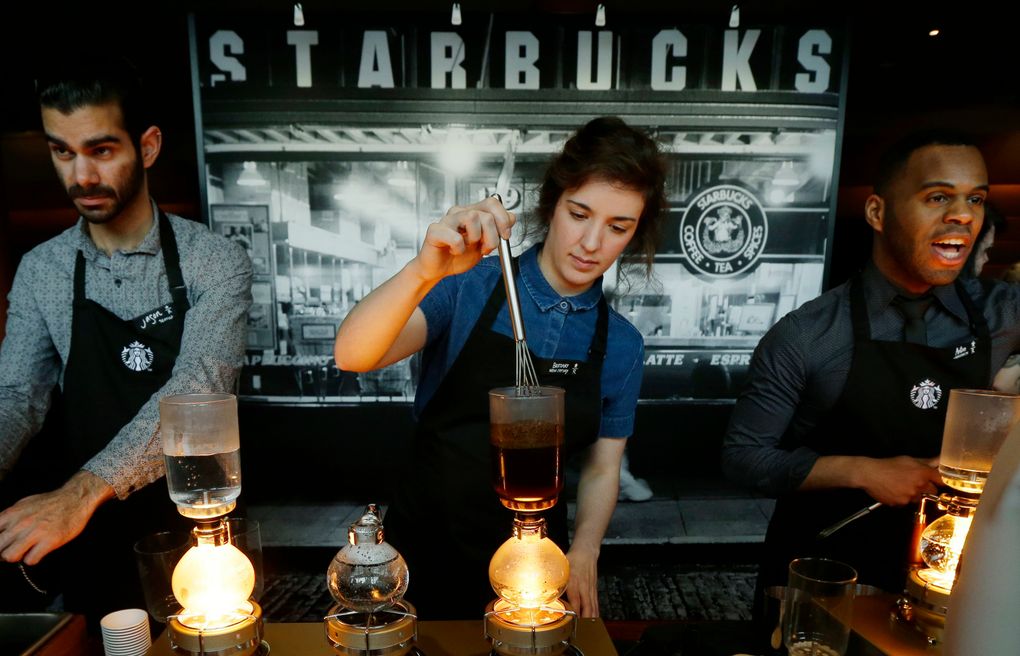Starbucks hikes base pay for all employees and bumps up stock awards

Janet I. TuSeattle Times business reporter
Starbucks is raising the base pay of all employees, including store managers, in its U.S. company-owned stores by 5 percent or more starting Oct. 3.
The range of increase will depend on “geographic and market factors and is intended to ensure Starbucks remains a retail employer of choice in all the markets where we operate,” CEO Howard Schultz wrote in a letter to employees Monday.
Starbucks declined to disclose how much pay will be rising in the Seattle area or any area-specific wage information.
“Our field leadership will be following up with market by market details in the coming weeks,” Schultz wrote in his letter.
In addition, the company will be doubling the annual company stock award for employees who reach two years of continuous service. Combined, the changes should result in compensation increases of 5 to 15 percent, Schultz said in the letter.
Worker and minimum pay issues have swept across the country in recent years, with more cities and states considering or passing higher minimum wage laws. Seattle passed its own minimum wage law in 2014. The current minimum wage in the city is $13 an hour for large employers such as Starbucks, and will go up to $15 in January next year.
Starbucks and other retailers have also been at the center of a ongoing debate over scheduling practices. Some workers say they dont’ get enough work hours to make ends meet, and are given work unpredictable and erratic schedules. Jaime Prater, a barista in Southern California,recently started a petition accusing the coffee chain of drastically cutting work hours at its stores; it drew thousands of signatures and the attention of Schultz. The City of Seattle is considering a law that could address those scheduling issues.
In his letter to employees, Schultz didn’t outline any changes but said the company was committed to making “every effort to help you meet your specific scheduling needs especially when it comes to ensuring your benefits eligibility.” He added that “you have my personal commitment that we will work with every partner to ensure you have the hours you need.”
Prater said in an email that he was heartened by Schultz reaching out to employees, but didn’t think the Starbucks CEO adequately addressed or acknowledged “what’s happening in stores, the loss of hours, the understaffing, the underemployement, and fair wages for tenured partners.”
“However much a pay raise is a welcome surprise (and it is) it doesn’t fix or address staffing issues,” Prater wrote.
In his letter, Schultz also said the company will also be putting up interactive online tools to allow employees to easily compare and choose health coverage plans. Starbucks offers health benefits and equity to those who work 20 hours a week or more.
Schultz also said, without providing details, that the company has updated its dress code for employees and will be talking about it at an employee open forum scheduled for the end of July. In 2014, the company loosened its dress code somewhat, allowing baristas to show their tattoos, except those on their faces and throats, after workers said wearing long sleeves to cover their body art was uncomfortable and outdated.
“We’ve heard your requests for more freedom when it comes to bringing your ‘whole self’ to work,” Schultz wrote in his letter. “We believe that more variety, flexibility and personalization will further elevate the Starbucks Experience – for partners and customers alike. Our latest dress code changes are designed to work well with the green apron while expanding your options, providing more room for self-expression, and allowing you to choose from items that may already be part of your everyday wardrobe.”
Coincidentally or not, Starbucks is expected to raise the prices of some of its drinks Tuesday, perhaps by as much as 30 cents.
Last July, Starbucks raised its prices 3.5 times as much in Seattle as in the rest of the country. It raised the price of its typical coffeeshop purchase across the U.S. by 1 percent, but in Seattle by 3.5 percent.
No comments:
Post a Comment